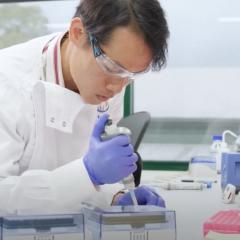Stem cells from the placenta could be used to treat patients with chronic cardiovascular disease, preventing devastating health outcomes like amputation.
Dr Jatin Patel from the UQ Centre for Clinical Research will use stem cells taken following a caesarean section, to help form new blood vessels in affected areas of the body and restore circulation.
Using an innovative new method recently patented by Dr Patel, he is able to isolate large quantities of stem cells, called endothelial progenitors (EPCs) from the placenta.
Blood vessels, including arteries are generated in our body through the activity of these particular stem cells.
“The availability of large quantities of EPCs offers new therapeutic possibilities in cardiovascular diseases,” Dr Patel said.
Cardiovascular diseases are responsible for most disease related deaths in Australia, resulting in years of life lost and a huge cost to our health system.
“In many cases, defective arteries that need to be either re-opened or bypassed restrict the supply of blood to an essential organ,” he said.
“Unfortunately surgery is not an option for every patient, so for those with severely restricted blood flow their only option is amputation of the affected limb.”
Until now, clinical trials using EPC treatment has been hampered by the lack of obtainability of these stem cells.
With the recent availability of large quantities of EPCs, Dr Patel can now study these cells as a ready-to-use product in models of leg artery closure, a condition in patients that usually ends with amputation.”
“In particular, I will test the modalities of delivery of EPCs and will explore the benefit of adding EPCs onto the surface of medical devices, such as stents,” Dr Patel said.
Dr Patel was recently awarded a Postdoctoral Fellowship from the Heart Foundation to further his research in this area.
The ‘Future Leadership Fellowships’ program at the Heart Foundation offer funding to promising researchers who have been recognised as becoming a leader in the field of cardiovascular research.
Media: Kate Sullivan, Marketing Communications Officer, k.sullivan4@uq.edu.au or 3346 6041.



